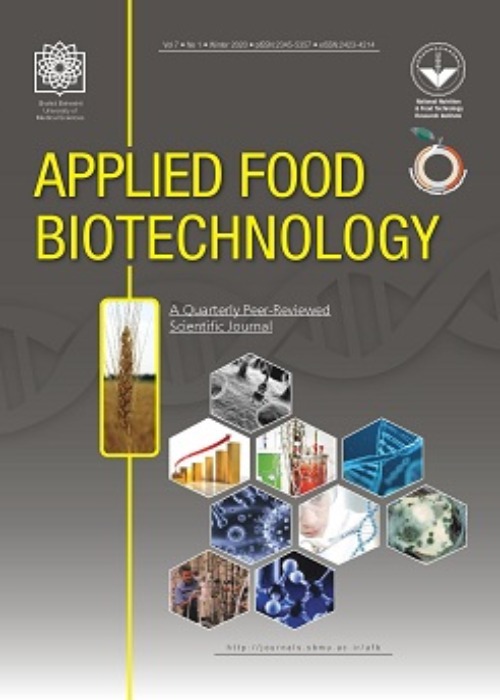Antibacterial Efficacy of Essential Oils and Sodium Nitrite in Vacuum processed Beef Fillet
Author(s):
Article Type:
Research/Original Article (دارای رتبه معتبر)
Abstract:
Background And Objective
Minimizing the exposure to nitrate and nitrite and therefore reducing the level of potentially carcinogenic nitrosamines is desired due to the strong public demand and political controversy around this issue in many countries. The present study was designed to investigate antibacterial activity of five different types of essential oils alone or in combination with different concentrations of sodium nitrite.Material and
Methods
Five types of essential oils Zataria multiflora Boiss, Satureja bachtiarica Bunge, Rosmarinus officinalis L., Mentha pulegium, and Origanum vulgare L were used in the experiments. NaNO2 in concentrations of 0, 100, and 200 mg kg-1 were used to study the growth inhibition of Clostridium spp. inoculated in vacuum processed beef fillet. Essential oils were analyzed by gas chromatography-mass spectrometry. Antimicrobial activity against vegetative cells of Clostridium perfringens and Clostridium sporogenes were primarily done by disc diffusion method and minimum inhibitory concentration of essential oils against vegetative cells were determined by broth macro dilution. Sensory evaluation of the uninoculated cooked vacuum processed beef fillet samples with three essential oils with higher antibacterial activity against the more resistant Clostridium spp. was done.Results and
Conclusion
Among the examined Essential oils Satureja bachtiarica Bunge showed the most inhibition effect on Clostridium perfringens (4.1 mg ml-1) and Clostridium sporogenes (5.5 mg ml-1) followed by Zataria multiflora Boiss, Origanum vulgare L., Mentha pulegium and Rosmarinus officinalis L. The antimicrobial activity of essential oils against Clostridium spp. was increased in combination with sodium nitrite. It can therefore be assumed that the combination of these two additives could have significant repercussion in the control of Clostridium perfringens and Clostridium sporogenes in vacuum processed beef fillet samples without compromising the organoleptic properties. The best result was achieved by the combination of 100 mg kg-1 sodium nitrite and 1.1 %v w-1 Satureja Bakhtiarica Bunge which could inhibit the growth of Clostridium species. The results of the current study showed that the essential oils of interest have had drastic effects on clostridium inhibition and could be used in the meat industry especially for sausages due to their impact on technological, microbiological and sensory properties.Conflict of interest: The authors declare no conflict of interest.
Keywords:
Language:
English
Published:
applied food biotechnology, Volume:5 Issue: 1, winter 2018
Pages:
1 to 10
magiran.com/p1781993
دانلود و مطالعه متن این مقاله با یکی از روشهای زیر امکان پذیر است:
اشتراک شخصی
با عضویت و پرداخت آنلاین حق اشتراک یکساله به مبلغ 1,390,000ريال میتوانید 70 عنوان مطلب دانلود کنید!
اشتراک سازمانی
به کتابخانه دانشگاه یا محل کار خود پیشنهاد کنید تا اشتراک سازمانی این پایگاه را برای دسترسی نامحدود همه کاربران به متن مطالب تهیه نمایند!
توجه!
- حق عضویت دریافتی صرف حمایت از نشریات عضو و نگهداری، تکمیل و توسعه مگیران میشود.
- پرداخت حق اشتراک و دانلود مقالات اجازه بازنشر آن در سایر رسانههای چاپی و دیجیتال را به کاربر نمیدهد.
In order to view content subscription is required
Personal subscription
Subscribe magiran.com for 70 € euros via PayPal and download 70 articles during a year.
Organization subscription
Please contact us to subscribe your university or library for unlimited access!


